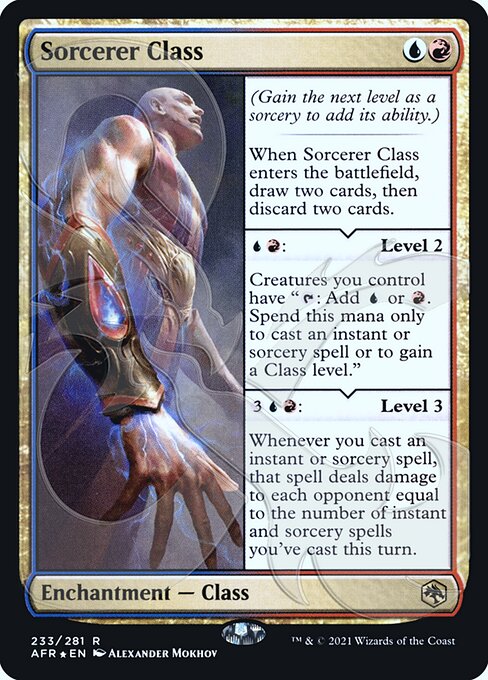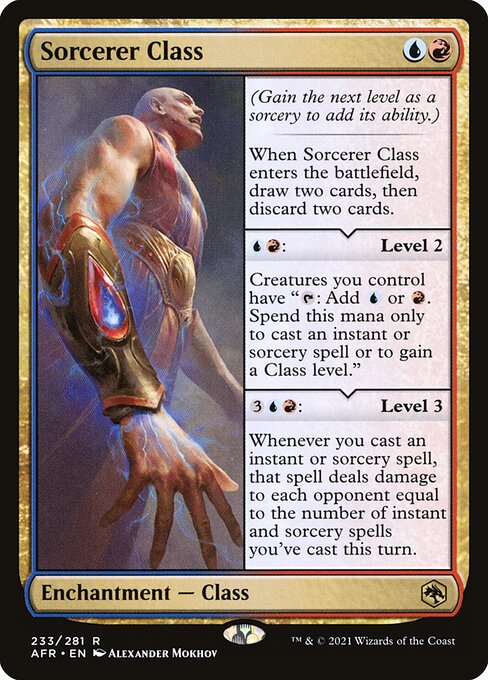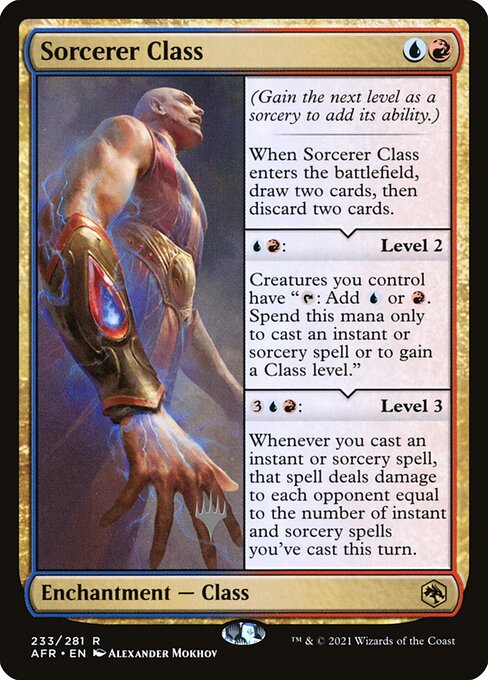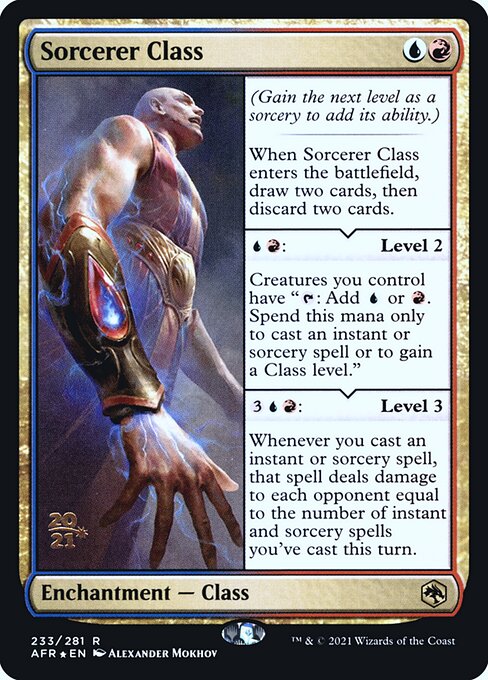Classe: Feiticeiro
Encantamento — Classe
(Ganhe o próximo nível como um feitiço para adicionar sua habilidade.)
Quando Classe: Feiticeiro entrar no campo de batalha, compre dois cards e depois descarte dois cards.
: Nível 2
//Level_2//
As criaturas que você controla têm ": Adicione ou . Gaste este mana somente para conjurar uma mágica instantânea ou um feitiço, ou para ganhar um nível de Classe".
: Nível 3
//Level_3//
Toda vez que você conjura uma mágica instantânea ou um feitiço, aquela mágica causa a cada oponente uma quantidade de dano igual ao número de mágicas instantâneas e feitiços que você conjurou neste turno.
Quando Classe: Feiticeiro entrar no campo de batalha, compre dois cards e depois descarte dois cards.
: Nível 2
//Level_2//
As criaturas que você controla têm ": Adicione ou . Gaste este mana somente para conjurar uma mágica instantânea ou um feitiço, ou para ganhar um nível de Classe".
: Nível 3
//Level_3//
Toda vez que você conjura uma mágica instantânea ou um feitiço, aquela mágica causa a cada oponente uma quantidade de dano igual ao número de mágicas instantâneas e feitiços que você conjurou neste turno.
standard
future
historic
gladiator
pioneer
explorer
modern
legacy
pauper
vintage
penny
commander
brawl
alchemy
paupercommander
duel
oldschool
premodern
Rulings
If the spell that causes the last ability to trigger is countered or is otherwise no longer on the stack as the ability resolves, it will still deal damage. Last known information will be used to do determine the effects of that damage. For example, if the spell has lifelink, you will still gain life when it deals damage, even if the spell was countered.
Each Class starts with only the first of three class abilities. As the first level ability resolves, the Class becomes level 2 and gains the second class ability. As the second level ability resolves, the Class becomes level 3 and gains the third class ability.
You can multiclass or even control multiple Class enchantments of the same class. Each Class permanent tracks its own level separately.
Each Class has five abilities. The three in the major sections of its text box are class abilities. Class abilities can be static, activated, or triggered abilities. The other two are level abilities, one activated ability to advance the Class to level 2 and another to advance the Class to level 3.
The last ability counts the number of spells that were cast before it resolved, not the number of spells that were cast before it was placed on the stack. For example, if you cast a sorcery and then respond to Sorcerer Class's triggered ability by casting an instant, both triggered abilities will deal 2 damage when they resolve.
Some Class cards have an effect that increases when more are under your control. For example, if you have multiple Barbarian Class cards, you roll that many additional dice and ignore that many of the lowest rolls.
You can't activate the first level ability of a Class unless that Class is level 1. Similarly, you can't activate the second level ability of a Class unless that Class is level 2.
Gaining a level won't remove abilities that a Class had at a previous level.
Copying a spell won't cause Sorcerer Class's level 3 ability to trigger and won't be counted toward the number of spells you've cast during the turn. However, if an effect copies a card and you cast the copy, that will count for both of those things.
Gaining a level is a normal activated ability. It uses the stack and can be responded to.
Each Class starts with only the first of three class abilities. As the first level ability resolves, the Class becomes level 2 and gains the second class ability. As the second level ability resolves, the Class becomes level 3 and gains the third class ability.
You can multiclass or even control multiple Class enchantments of the same class. Each Class permanent tracks its own level separately.
Each Class has five abilities. The three in the major sections of its text box are class abilities. Class abilities can be static, activated, or triggered abilities. The other two are level abilities, one activated ability to advance the Class to level 2 and another to advance the Class to level 3.
The last ability counts the number of spells that were cast before it resolved, not the number of spells that were cast before it was placed on the stack. For example, if you cast a sorcery and then respond to Sorcerer Class's triggered ability by casting an instant, both triggered abilities will deal 2 damage when they resolve.
Some Class cards have an effect that increases when more are under your control. For example, if you have multiple Barbarian Class cards, you roll that many additional dice and ignore that many of the lowest rolls.
You can't activate the first level ability of a Class unless that Class is level 1. Similarly, you can't activate the second level ability of a Class unless that Class is level 2.
Gaining a level won't remove abilities that a Class had at a previous level.
Copying a spell won't cause Sorcerer Class's level 3 ability to trigger and won't be counted toward the number of spells you've cast during the turn. However, if an effect copies a card and you cast the copy, that will count for both of those things.
Gaining a level is a normal activated ability. It uses the stack and can be responded to.
Rulings
If the spell that causes the last ability to trigger is countered or is otherwise no longer on the stack as the ability resolves, it will still deal damage. Last known information will be used to do determine the effects of that damage. For example, if the spell has lifelink, you will still gain life when it deals damage, even if the spell was countered.
Each Class starts with only the first of three class abilities. As the first level ability resolves, the Class becomes level 2 and gains the second class ability. As the second level ability resolves, the Class becomes level 3 and gains the third class ability.
You can multiclass or even control multiple Class enchantments of the same class. Each Class permanent tracks its own level separately.
Each Class has five abilities. The three in the major sections of its text box are class abilities. Class abilities can be static, activated, or triggered abilities. The other two are level abilities, one activated ability to advance the Class to level 2 and another to advance the Class to level 3.
The last ability counts the number of spells that were cast before it resolved, not the number of spells that were cast before it was placed on the stack. For example, if you cast a sorcery and then respond to Sorcerer Class's triggered ability by casting an instant, both triggered abilities will deal 2 damage when they resolve.
Some Class cards have an effect that increases when more are under your control. For example, if you have multiple Barbarian Class cards, you roll that many additional dice and ignore that many of the lowest rolls.
You can't activate the first level ability of a Class unless that Class is level 1. Similarly, you can't activate the second level ability of a Class unless that Class is level 2.
Gaining a level won't remove abilities that a Class had at a previous level.
Copying a spell won't cause Sorcerer Class's level 3 ability to trigger and won't be counted toward the number of spells you've cast during the turn. However, if an effect copies a card and you cast the copy, that will count for both of those things.
Gaining a level is a normal activated ability. It uses the stack and can be responded to.
Each Class starts with only the first of three class abilities. As the first level ability resolves, the Class becomes level 2 and gains the second class ability. As the second level ability resolves, the Class becomes level 3 and gains the third class ability.
You can multiclass or even control multiple Class enchantments of the same class. Each Class permanent tracks its own level separately.
Each Class has five abilities. The three in the major sections of its text box are class abilities. Class abilities can be static, activated, or triggered abilities. The other two are level abilities, one activated ability to advance the Class to level 2 and another to advance the Class to level 3.
The last ability counts the number of spells that were cast before it resolved, not the number of spells that were cast before it was placed on the stack. For example, if you cast a sorcery and then respond to Sorcerer Class's triggered ability by casting an instant, both triggered abilities will deal 2 damage when they resolve.
Some Class cards have an effect that increases when more are under your control. For example, if you have multiple Barbarian Class cards, you roll that many additional dice and ignore that many of the lowest rolls.
You can't activate the first level ability of a Class unless that Class is level 1. Similarly, you can't activate the second level ability of a Class unless that Class is level 2.
Gaining a level won't remove abilities that a Class had at a previous level.
Copying a spell won't cause Sorcerer Class's level 3 ability to trigger and won't be counted toward the number of spells you've cast during the turn. However, if an effect copies a card and you cast the copy, that will count for both of those things.
Gaining a level is a normal activated ability. It uses the stack and can be responded to.
Your collection? Your decks?
Want to manage your collection and/or create decks?



 0
0
 0.94€
0.94€

